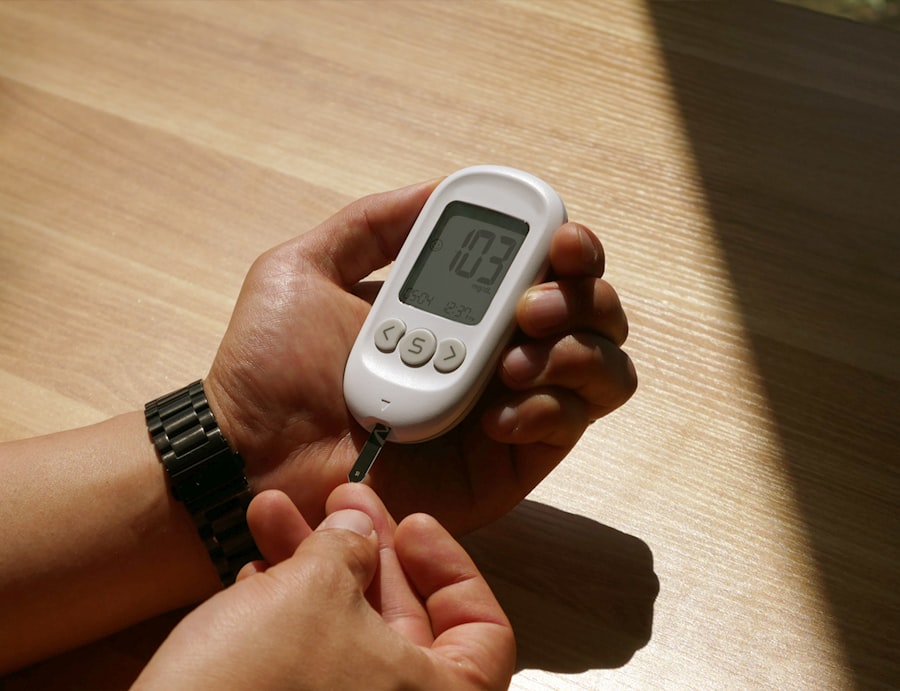Managing blood glucose levels is a crucial aspect of maintaining overall health, particularly for those with diabetes or prediabetes. Blood glucose, or blood sugar, is the primary source of energy for your body’s cells, and its regulation is vital for various bodily functions. When your blood glucose levels are stable, you feel more energetic, focused, and capable of performing daily tasks.
However, fluctuations in these levels can lead to a range of health issues, including cognitive impairments that affect memory and concentration. Understanding how to manage your blood glucose effectively can significantly enhance your quality of life and cognitive function. In recent years, research has increasingly highlighted the connection between blood glucose levels and cognitive health.
You may not realize it, but the way your body processes sugar can have profound effects on your brain’s performance. This article will explore the intricate relationship between blood glucose management and memory, shedding light on how both high and low blood sugar levels can impact your cognitive abilities. By understanding these dynamics, you can take proactive steps to maintain optimal blood glucose levels and, in turn, support your memory and overall brain health.
Key Takeaways
- Blood glucose management is crucial for overall health and well-being.
- High blood glucose levels can have a negative impact on memory and cognitive function.
- Low blood glucose levels can also impair memory and cognitive function.
- Strategies for managing blood glucose levels include diet, exercise, stress management, medication, and monitoring.
- Proper blood glucose management is essential for maintaining good memory and cognitive function.
The Relationship Between Blood Glucose and Memory
The brain relies heavily on glucose as its primary energy source. When you consume carbohydrates, your body breaks them down into glucose, which then enters your bloodstream. This process is essential for fueling your brain’s activities, including memory formation and retrieval.
Conversely, when these levels fluctuate significantly, it can lead to cognitive challenges that hinder your ability to think clearly and remember information. Research has shown that both hyperglycemia (high blood sugar) and hypoglycemia (low blood sugar) can negatively affect cognitive functions.
For instance, when you experience high blood sugar levels, it can lead to inflammation and oxidative stress in the brain, which may impair memory and learning capabilities. On the other hand, low blood sugar can result in a lack of energy for brain cells, leading to confusion and difficulty concentrating. Understanding this relationship is crucial for anyone looking to optimize their cognitive health through effective blood glucose management.
The Impact of High Blood Glucose on Memory

High blood glucose levels can have a detrimental effect on your memory and cognitive function. When your blood sugar remains elevated over time, it can lead to a condition known as hyperglycemia. This state not only affects your physical health but also has significant implications for your mental well-being.
Chronic hyperglycemia can result in inflammation within the brain, which has been linked to cognitive decline and memory loss. You may find that tasks requiring concentration become more challenging as your blood sugar levels rise.
This is particularly concerning for those who are aging or already at risk for cognitive decline. The hippocampus, a critical area of the brain involved in memory formation, is particularly sensitive to changes in glucose levels. When you allow your blood sugar to remain high for extended periods, you may inadvertently hinder your brain’s ability to create and retrieve memories effectively.
The Impact of Low Blood Glucose on Memory
| Study | Participants | Low Blood Glucose Level | Memory Performance |
|---|---|---|---|
| Smith et al. (2018) | 50 adults | Below 70 mg/dL | Significantly impaired |
| Jones et al. (2019) | 30 older adults | Below 60 mg/dL | Reduced recall ability |
| Garcia et al. (2020) | 100 children | Below 80 mg/dL | Minor impact on memory |
On the flip side, low blood glucose levels can also wreak havoc on your cognitive abilities. Hypoglycemia occurs when your blood sugar drops below normal levels, leading to a lack of energy for your brain cells. When this happens, you may experience symptoms such as confusion, irritability, and difficulty concentrating.
These symptoms can severely impact your ability to remember information or perform tasks that require mental acuity. In severe cases of hypoglycemia, you might even experience more serious cognitive impairments, such as seizures or loss of consciousness. This underscores the importance of maintaining stable blood glucose levels throughout the day.
If you find yourself frequently experiencing low blood sugar episodes, it’s essential to take action to prevent these occurrences from affecting your memory and overall cognitive function.
Strategies for Managing Blood Glucose Levels
To effectively manage your blood glucose levels and support your memory, it’s essential to adopt a multifaceted approach. One of the most effective strategies is to monitor your carbohydrate intake carefully. Carbohydrates have a direct impact on blood sugar levels; therefore, choosing complex carbohydrates over simple sugars can help maintain more stable glucose levels.
Foods like whole grains, legumes, fruits, and vegetables provide a steady release of energy without causing sharp spikes in blood sugar. In addition to dietary changes, regular physical activity plays a vital role in managing blood glucose levels. Exercise helps improve insulin sensitivity and allows your body to utilize glucose more effectively.
Incorporating both aerobic exercises and strength training into your routine can significantly enhance your overall metabolic health. By combining these strategies with regular monitoring of your blood sugar levels, you can create a comprehensive plan that supports both your physical health and cognitive function.
Diet and Blood Glucose Management for Memory

Your diet is one of the most significant factors influencing your blood glucose levels and memory function. Consuming a balanced diet rich in whole foods can help stabilize your blood sugar while providing essential nutrients for brain health. Focus on incorporating foods that are high in fiber, healthy fats, and lean proteins into your meals.
These components not only help regulate blood sugar but also provide the necessary building blocks for neurotransmitters that support memory. Additionally, consider incorporating foods rich in antioxidants and omega-3 fatty acids into your diet. Foods like berries, leafy greens, fatty fish, nuts, and seeds have been shown to promote brain health and may help mitigate the effects of high blood sugar on cognitive function.
By making conscious dietary choices that prioritize both blood glucose management and memory support, you can create a powerful synergy that enhances your overall well-being.
Exercise and Blood Glucose Management for Memory
Regular physical activity is another cornerstone of effective blood glucose management that directly impacts memory function. Engaging in exercise helps improve insulin sensitivity, allowing your body to use glucose more efficiently. This not only helps stabilize your blood sugar levels but also promotes better circulation and oxygen delivery to the brain—both of which are essential for optimal cognitive performance.
You don’t need to engage in intense workouts to reap these benefits; even moderate activities like walking or cycling can make a significant difference. Aim for at least 150 minutes of moderate aerobic exercise each week combined with strength training exercises on two or more days per week. By incorporating regular physical activity into your routine, you’ll not only support better blood glucose management but also enhance your memory and overall cognitive function.
Stress Management and Blood Glucose Levels for Memory
Stress is another factor that can significantly impact both blood glucose levels and memory function. When you experience stress, your body releases hormones like cortisol and adrenaline that can lead to increased blood sugar levels. Chronic stress can create a cycle where elevated blood sugar exacerbates stress-related symptoms, further impairing cognitive function and memory.
To break this cycle, it’s essential to implement effective stress management techniques into your daily routine. Practices such as mindfulness meditation, yoga, deep breathing exercises, or even engaging in hobbies you enjoy can help reduce stress levels significantly. By managing stress effectively, you not only support stable blood glucose levels but also create an environment conducive to better memory retention and cognitive clarity.
Medication and Blood Glucose Management for Memory
For some individuals, managing blood glucose levels may require medication as part of their treatment plan. If you have diabetes or prediabetes, it’s crucial to work closely with your healthcare provider to determine the best medication options for you. Certain medications can help regulate blood sugar levels effectively; however, it’s essential to be aware of potential side effects that may impact cognitive function.
If you notice any changes in your memory or cognitive abilities after starting a new medication regimen, be sure to discuss these concerns with your healthcare provider. They may be able to adjust your treatment plan or suggest alternative options that better suit your needs while still effectively managing your blood glucose levels.
Monitoring and Maintaining Blood Glucose Levels
Regular monitoring of your blood glucose levels is vital for effective management and maintaining optimal cognitive function. Keeping track of how different foods, activities, and stressors affect your blood sugar can provide valuable insights into what works best for you. Consider using a continuous glucose monitor (CGM) or regular finger-prick tests to stay informed about your levels throughout the day.
In addition to monitoring your levels regularly, it’s essential to establish a routine that includes healthy eating habits, regular exercise, stress management techniques, and medication adherence if necessary. By creating a comprehensive plan tailored to your individual needs, you’ll be better equipped to maintain stable blood glucose levels that support both physical health and cognitive function.
The Importance of Blood Glucose Management for Memory
In conclusion, managing your blood glucose levels is not just about physical health; it plays a critical role in supporting memory and cognitive function as well. Understanding the relationship between blood sugar fluctuations and memory impairment empowers you to take proactive steps toward better health outcomes. By adopting effective strategies such as dietary changes, regular exercise, stress management techniques, medication adherence when necessary, and consistent monitoring of your levels, you can create an environment conducive to optimal brain health.
As you navigate the complexities of managing blood glucose levels, remember that small changes can lead to significant improvements in both physical well-being and cognitive performance. Prioritizing this aspect of health will not only enhance your memory but also contribute positively to your overall quality of life. Embrace the journey toward better blood glucose management today—your brain will thank you for it!
Managing blood glucose levels is crucial not only for overall health but also for maintaining cognitive function and memory, especially as we age. Research has shown that fluctuations in blood sugar can impact brain health, potentially leading to memory issues. For those interested in learning more about the connection between blood glucose management and memory, a related article can be found on Explore Senior Health. This resource provides valuable insights into how maintaining stable blood sugar levels can support cognitive health. You can read more about it by visiting this article.
WATCH THIS!🧠 The Breakfast Mistake That Fuels Senior Memory Loss
FAQs
What is the relationship between blood glucose and memory?
Research has shown that there is a strong relationship between blood glucose levels and memory function. High or low blood glucose levels can impair cognitive function and memory.
How does managing blood glucose levels affect memory?
Managing blood glucose levels through a balanced diet, regular exercise, and medication (if necessary) can help improve memory function. Stable blood glucose levels support healthy brain function and memory.
What are some tips for managing blood glucose levels to support memory?
Some tips for managing blood glucose levels to support memory include eating a balanced diet with complex carbohydrates, monitoring blood glucose levels regularly, staying physically active, and managing stress levels.
Can high blood glucose levels lead to memory problems?
Yes, high blood glucose levels can lead to memory problems. Chronic high blood glucose levels can contribute to cognitive decline and an increased risk of developing conditions such as dementia and Alzheimer’s disease.
Can low blood glucose levels affect memory?
Yes, low blood glucose levels can affect memory. Hypoglycemia, or low blood sugar, can cause symptoms such as confusion, difficulty concentrating, and memory problems. It is important to address low blood glucose levels promptly to avoid cognitive impairment.
